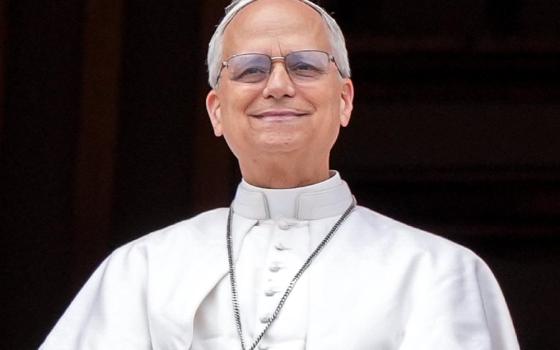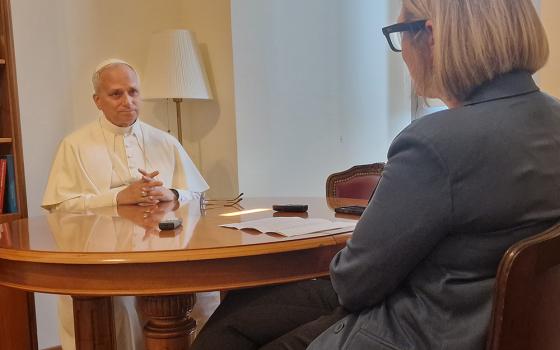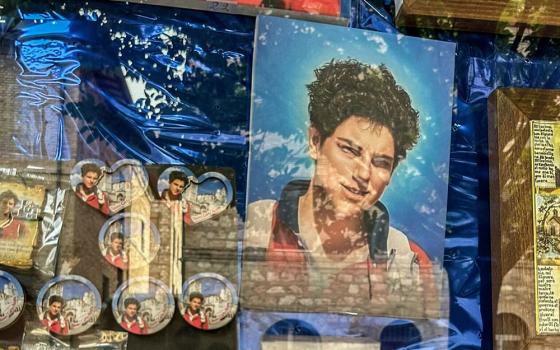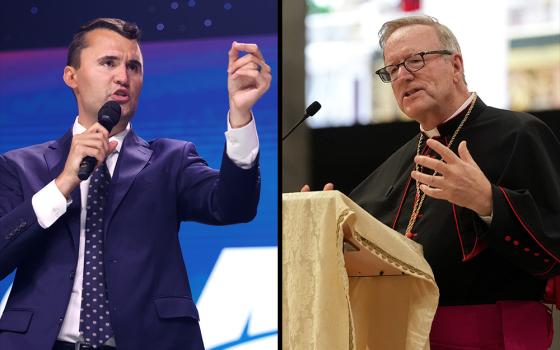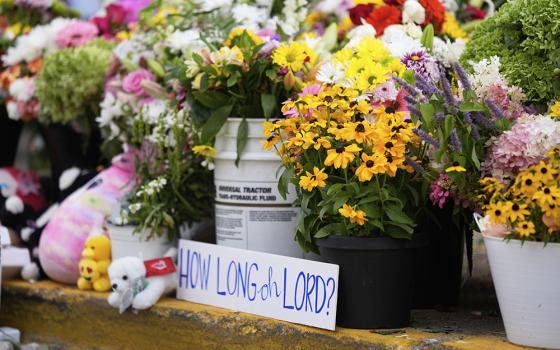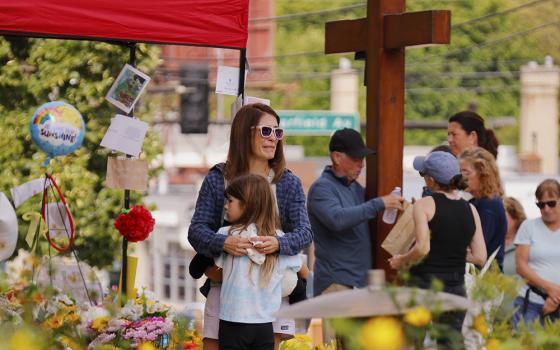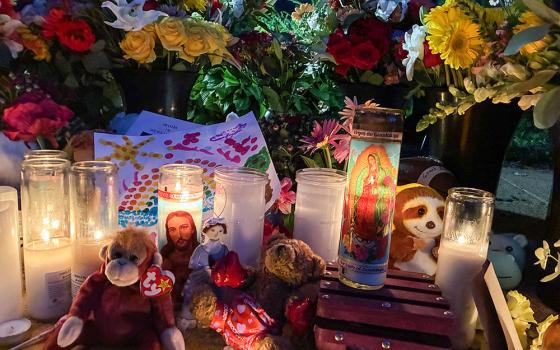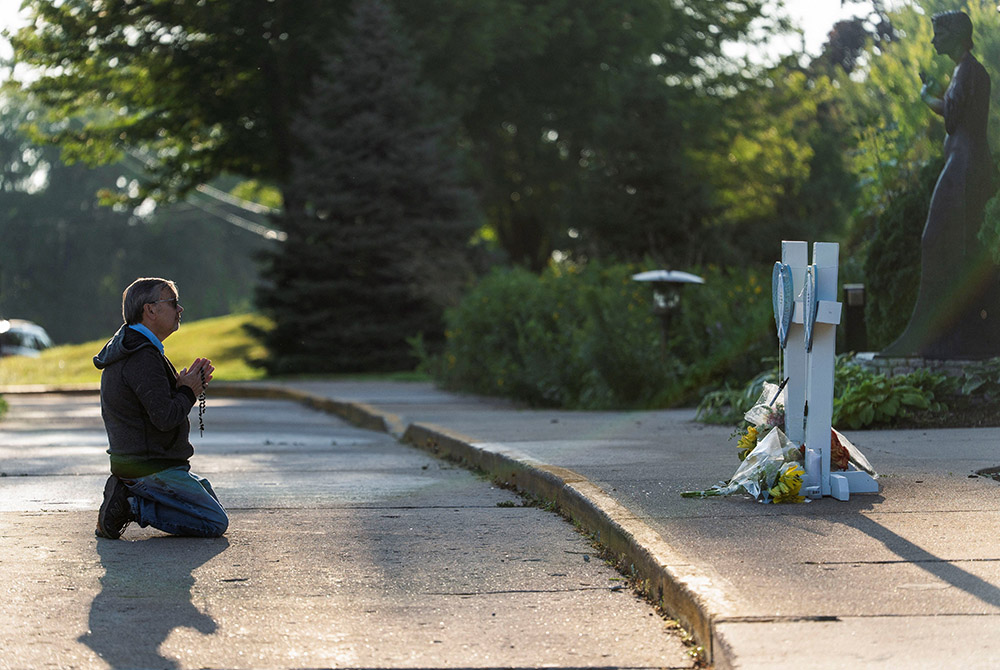
A man prays near crosses outside Annunciation Church in Minneapolis Aug. 28, 2025, following a shooting the previous day. A shooter opened fire with a rifle through the windows of the school's church and struck children attending Mass Aug. 27 during the first week of school, killing two and wounding 17 people in an act of violence the police chief called "absolutely incomprehensible." (OSV News/Reuters/Tim Evans)
"Who is wise enough to understand this? To whom has the mouth of the LORD spoken? Let him declare it! Why is the land ravaged, scorched like a wilderness no one crosses?" (Jeremiah 9:11)
As the news unfolded Wednesday about the shootings at Annunciation church and school in Minneapolis, the more we learned, the less we understood.
Children shot while at Mass, during the first week of the school year. We can ask how, but it is vain to ask why.
Two children killed, 15 more wounded, as well as three adults. All at prayer. All filled with the excitement of the first week of school. Hope turned to horror, and such a horror.
The killer, only 23-years-old, had clearly been planning the attack and hoping to kill as many children as possible. What kind of depravity is that?
The primordial cry of the parents rings painfully in the ear: Why?
Advertisement
The current translation of St. Paul's Second Letter to the Thessalonians reads: "For the mystery of lawlessness is already at work" (2:7). I prefer the Douay Rheims translation: "For the mystery of iniquity already worketh." The mysterium iniquitatis, the mystery of evil, revealed itself Wednesday morning in a leafy Minneapolis neighborhood, not just lawlessness, but evil.
Detectives are busy determining what possessed the killer to do something so horrific. But no detective can get to the root of evil, why this person turned to crime and that person did not, why this person's anger or frustrations took a murderous turn when others grew and matured in the face of the difficulties life gave them. We all sin because sin is fun, but this was not that kind of sin. This was sadistic. The purity of the evil is as obvious as it is difficult to fathom.
One of the most horrible lessons of living a long life is the realization that mental illness and evil are distinct, but the line between the two is porous. They feed on each other, nourish each other. At some point, mental illness sets the stage for an evil desire and, at another point, the evil desire takes on flesh and becomes a plan. Finally, the last inhibition is crossed and the plan is executed, the evil explodes into the lives of others. The stages are the same even if they do not always end in a murderous act. And the fact that the stages are so recognizable does not make them explicable.
Whatever torments the assailant faced, there is no rational explanation for this horrific act. The mystery of evil remains a mystery, something ultimately beyond our comprehension. No matter how much we learn about the particulars of the evil, its source, why it becomes potent in some while remaining latent in others, this is all behind a veil through which we cannot see.
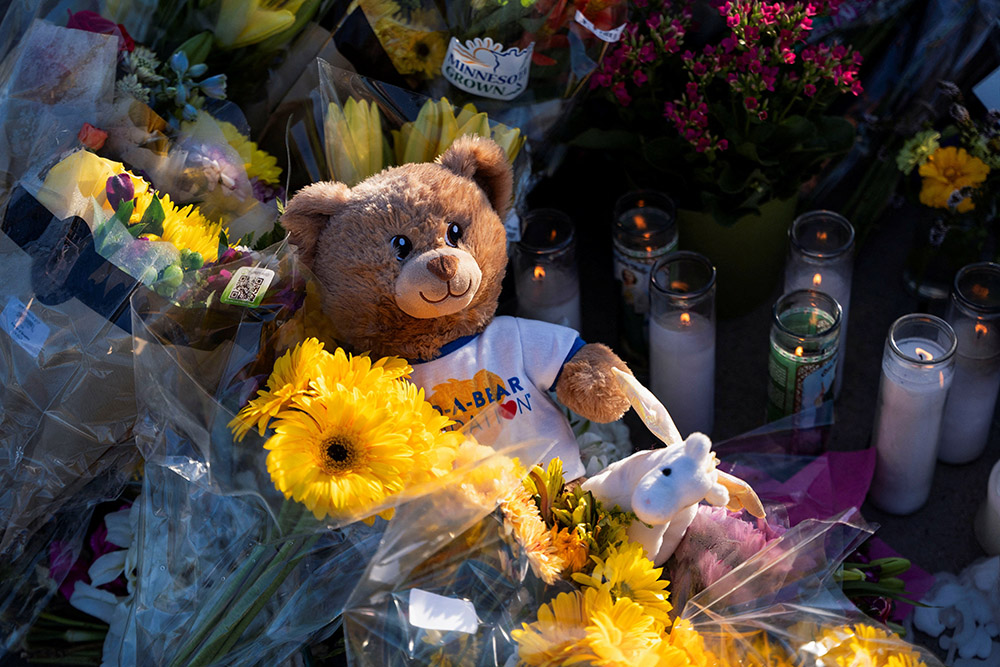
A teddy bear is seen at a makeshift memorial at Annunciation Church in Minneapolis Aug. 28, 2025, following a shooting the previous day. (OSV News/Reuters/Tim Evans)
The Book of Job is instructive here. When Job's friends try to explain to him why he suffered, God upbraids them. In the immediate face of suffering, explanations are distractions. The only thing to do is be present — in person and in prayer — to the people who are suffering, to affect Christian solidarity. I can't remember a single thing that was said to me by the 200 people who came to my mother's wake, but I remember who came and how comforting their presence was.
We tend to react to ontic evil differently from the way we react to moral evil. Earthquakes and hurricanes do not have a motive for the evil they inflict. There is no one to blame for a tsunami. But we, as a society, study seismic shifts, we send weather planes into hurricanes to measure their strength and we place tsunami buoys throughout the oceans to give advance warning.
When it comes to guns, however, our society is incapable of erecting any warning mechanisms or limiting access to the most lethal of weapons. It is as if we had the power to stop hurricanes from ever reaching land, and declined to use it. Limiting access to guns will not eliminate violence, but it is harder and takes longer to kill multiple people with a knife. Nor is it difficult to permit gun ownership for hunting while limiting the sale of guns used in most attacks on human beings. At the very least, we could renew the ban on the sale of assault weapons that passed into law in 1994 but was not renewed 10 years later.
What stands in the way? Well-funded misinformation and conspiracy theories. The National Rifle Association has convinced millions of hunters that if the government can ban Saturday night specials, it won't be long until the government comes for their hunting rifle. Gun manufacturers pay top dollar to their mostly Republican supporters who stand in the way of even the most sensible kinds of gun control, far outpacing the amount of money spent by advocates of gun control. It is a horrible thing to contemplate that our societal inability to limit access to guns comes down to a love of money by manufacturers and politicians.
The struggle to lessen the political influence of the gun lobby must wait until after we bury the dead. The task this week is to mourn the lost and stand in solidarity with the survivors. "The church is always her best at a funeral," a priest once said to me, and it is true.
The church gives us a liturgy that is familiar, little different from a Sunday liturgy, so that people do not need to learn and perform, they can simply pray. To the suffering, the church gives solidarity, we rally around those whose loss is unbearable and help them bear it. The church has the honesty to admit that there is, finally, no answer to the question "why?" The world has nothing left to say on the face of death, but the church tells us the tomb is empty. It is the church that poses a different question, drawn from the Gospel of Luke, a question pregnant with Christian hope: "Why do you seek the living among the dead?"

